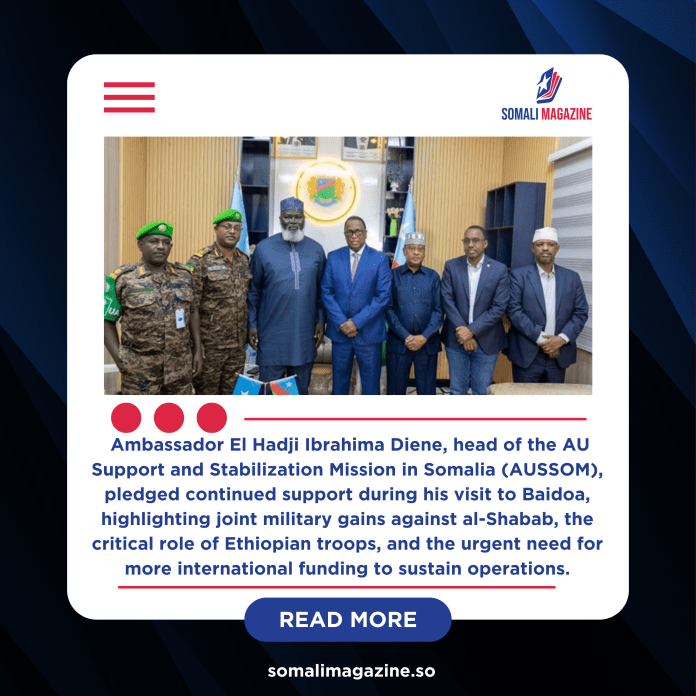Facebook Twitter (X) Instagram Somali Magazine - People's Magazine
The African Union’s top envoy to Somalia has promised continued support for Somali-led efforts to stabilize the country, as joint forces push deeper into areas long controlled by al-Shabab.
Ambassador El Hadji Ibrahima Diene, the AU Special Representative for Somalia and head of the AU Support and Stabilization Mission in Somalia (AUSSOM), gave the assurance during his first visit to Baidoa, the capital of South West State. Speaking to Somali officials and AU troops, Diene stressed that the mission’s priority is to back Somalia’s fight against terrorism while allowing the country to lead its own peace process. “We are supporting our Somali brothers and sisters. The ongoing operations are defined by Somalia’s federal government, and we are working closely with them to defeat al-Shabab,” he said.
The AU envoy pointed to the recapture of Barire, Sabid, and Anole as important victories in the campaign. Somali and AU forces regained control of the villages in late June after weeks of heavy fighting. But the gains remain fragile. On July 25, al-Shabab launched an assault on army positions in Sabid and Anole, killing four Somali soldiers and wounding seven. Backed by Ugandan troops serving under AUSSOM, the army fought back, killing 18 militants.
During his visit to Sector 3 headquarters in Baidoa, Diene praised Ethiopian troops for their frontline role in the fight. He noted that the sector, supported also by Ghana’s police unit, is well-structured but still faces many challenges. “A lot has been accomplished by our troops, and there is still much to be done,” he said.
Ethiopian troops continue to play a central role in Sector 3 despite political tensions between Mogadishu and Addis Ababa. In 2024, Somalia had announced it would not include Ethiopian forces in the new AU mission. But the decision was later reversed, as the government recognized the importance of Ethiopia’s experienced soldiers in ongoing operations. Sector 3 Commander Brigadier General Teklu Hurisa Janka welcomed Diene’s visit, saying his troops appreciated the envoy’s direct engagement. “We shared updates on the current situation and our operations against al-Shabab. The SRCC valued our efforts, and we equally valued his presence,” Janka said.
During his Baidoa tour, Diene also met South West State Parliament Speaker Ali Said Fiqi and other regional officials to review the security landscape. He visited the AUSSOM Level 2 hospital, where medical staff briefed him on the services provided to both soldiers and civilians. AUSSOM officially took over from the African Union Transition Mission in Somalia (ATMIS) on January 1, 2025, after the UN Security Council approved the new mandate. Unlike ATMIS, AUSSOM operates with a leaner force, shifting more responsibility to Somali forces as the country works toward full control of its own security. Diene’s Baidoa trip was his fourth inspection since assuming office. He had earlier visited other AU sectors across Somalia to understand challenges and strengthen coordination.
Despite progress, the mission faces serious financial shortfalls. The UN requested more than $40 million in extra support earlier this year to sustain logistics and air operations, but donors have been slow to respond. The UK pledged nearly $4 million in April, yet the gap remains wide. Diene admitted that resources are stretched but praised cooperation with the UN Support Office in Somalia (UNSOS) and the UN Mine Action Service (UNMAS). UNMAS recently reported nearly 600 improvised explosive device (IED) attacks since early 2024, killing more than 1,400 people — a clear sign that al-Shabab remains Somalia’s deadliest threat.
According to UN and AU data, the group has been behind almost 600 violent incidents in 2025 alone. A report by the Africa Center for Strategic Studies recently ranked Somalia as the second-worst country in Africa for extremist-related deaths. For Diene, Somalia’s stabilization remains a shared mission between the AU and Somali authorities. His visit to Baidoa reinforced the AU’s commitment to work alongside Somali forces and regional leaders, while also highlighting the urgent need for international funding and continued solidarity. As al-Shabab keeps up its violent campaign, the envoy emphasized that success will require not just military strength but also political unity and sustained global support.

